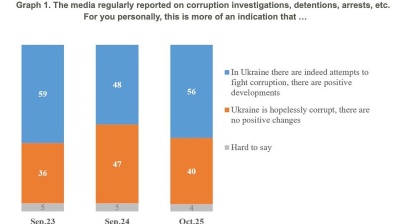Christine Lagarde, Managing Director of the International Monetary Fund (IMF), has urged Ukrainian President Petro Poroshenko to submit a bill on the mooted anti-corruption court to the nation's parliament as soon as possible, the fund said in a statement on December 7. The statement was published after Lagarde's phone conversation with Poroshenko on the same day.
Beneath the pleasantries of official statements like this, the international community is rapidly losing patience with the obvious reluctance of Poroshenko’s administration to take any decisive actions to curb endemic corruption. Western Europe has already been suffering from “Ukraine fatigue” and is increasingly distracted by its own internal political issues.
Ukraine’s relations with its donors have taken a sharp turn for the worse in the last month as infighting between the General Prosecutor’s Office (GPO), which is under Poroshenko’s direct control, and the National Anti-Corruption Bureau of Ukraine (NABU), the independent anti-graft body set up at donors' insistence, has broken out into the open.
What was remarkable about Lagarde’s comments was their specificity: she named all the parts of the proposed independent anti-graft apparatus, including NABU as well as the Special Anti-Corruption Prosecutor’s Office (SAPO), which performs the same function as the GPO, but is entirely independent from the government’s control. What is missing from the triumvirate is a court to hear the cases investigated by NABU and prosecuted by SAPO.
According to the IMF statement, Poroshenko is going to submit a bill to establish the missing anticorruption court "consistent with the Venice Commission’s recommendations and past agreements under the IMF-supported programme… It will be important that all members of the parliament unite behind the bill and approve it as a matter of priority," Lagarde added.
The reference to the “Venice Commission’s recommendations” is an important one as this commission has sent Ukraine an extremely detailed draft of how the bill should look. The government has drawn up its own version, but with this statement the IMF are in effect insisting that the donors write the law.
This is a pivotal moment for Ukraine and its relationship with the West. Because of foot dragging on many key reform efforts the IMF has already delayed a $1.5bn tranche from its $17.5bn programme from December to the first quarter of next year and the EU has also put off a €600mn transfer due this month, specifically due to the lack of progress on setting up the anti-corruption court. Moreover, in the last days the EU floated the possibility that it could undo the visa-free regime introduced earlier this year for Ukrainians as that deal was based on the promise of progress with the reform.
The anti-graft efforts are currently in focus but come on top of a raft of problems. Earlier, Ukraine and the IMF failed to agree on a new price-setting formula for domestic gas tariffs, which is crucial for the continuation of existing funding from the $17.5bn bailout agreed with the IMF in 2015. The greenlighting of pension reform and creation of a specialised anti-corruption court are among other steps that are necessary for further IMF funding.
The IMF is also negotiating with the government on the draft national budget for 2018. The fund is monitoring the fact that the national budget meets the IMF programme goals; in particular, that the budget deficit remains within 2.5% of GDP.
Lagarde also emphasised that investigating and promptly adjudicating incidences of corruption is critical to advance these objectives and maintain public trust. In this regard, Lagarde and Poroshenko "agreed on the need to maintain the independence and enhance the operational capacity" of NABU and SAPO.
"I assured the president that the IMF stands ready to continue to support Ukraine, along with other international partners, in the fight against corruption and encouraged the authorities to accelerate the implementation of reforms that are necessary to further improve the prospects of Ukraine’s economy and its people," Lagarde added in the statement.
It remains to be seen if Poroshenko’s acquiesce to Lagarde’s explicit demands is anything more than lip service as even if the recent effort to gut NABU was stymied by the international outcry, Ukraine's parliament still managed to fire the reformist head of the legislative's anti-corruption committee Egor Sobolev on December 7.
A highly respected liberal, Sobolev is credited with blocking over 300 draft laws because they were vehicles for corruption or catered to special interests. He has also been a rare vocal supporter and defender of NABU in the government. The motion to sack Sobolev was supported by 256 lawmakers versus the minimum 226 votes required for a decision. Sobolev is a member of the opposition Samopomich (Self-Reliance) parliamentary faction, created by Andriy Sadovyi, mayor of the western Ukrainian city of Lviv.
News

Hong Kong cargo plane crash: authorities defend safety procedures amid ongoing probe
Hong Kong airport and rescue authorities have reaffirmed their confidence in the airport’s safety protocols after a cargo plane crashed into the sea early on October 20, killing two.

Thousands rally in Tirana demanding justice for former KLA leaders on trial in The Hague
Albanian PM Edi Rama called the protest, urging all Albanians to unite behind what he described as a “national cause” — defending the honour and legacy of Kosovo’s wartime leaders.

Putin's meeting with Trump in Budapest is a slap in the face for the EU
As preparations get underway for a highly anticipated summit between Russian President Vladimir Putin and former US President Donald Trump in Budapest, attention is turning to an unusual but politically sensitive detail: how will Putin get there?

Zelenskiy leaves Washington empty handed, Trump and Putin head to Budapest to talk business
Ukrainian President Volodymyr Zelenskiy went into a White House meeting with US President Donald Trump on October 17 hoping for a big arms deal. He came out of the meeting empty handed.


